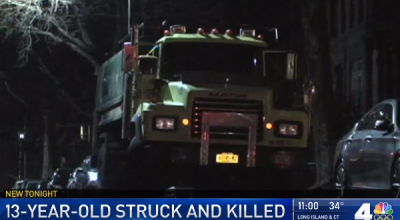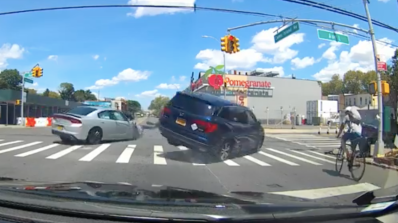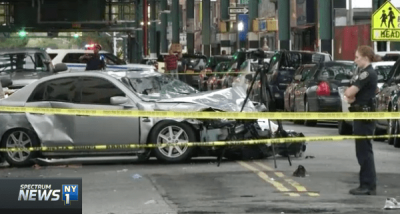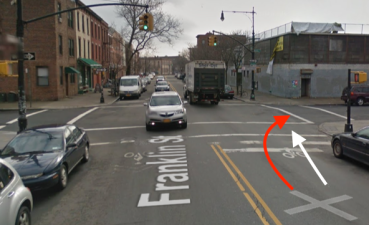KOMANOFF: Listening to Lehrer Helps Understand The Mindset Keeping our Streets Unsafe
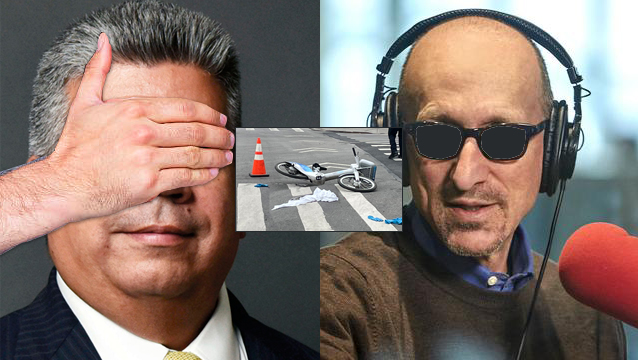
Hearing Brooklyn District Attorney Eric Gonzalez and WNYC radio host Brian Lehrer chatting it up on Lehrer’s show Wednesday morning gave me a new insight into why New York streets remain so unsafe for cyclists and pedestrians.
The first caller, Debby, clearly distraught about road violence, asked Gonzalez why law enforcement isn’t seizing cars with defaced or counterfeit “ghost plates” that are metastasizing across the five boroughs. She pointed to the death the day before of a Citi Bike-riding Brooklyn mother of two who was run over by a box truck driver on a treacherous strip of Ninth Street in Gowanus, where the city DOT for years has rebuffed pleas to extend the protected bike lane to the very area where she was killed.

Gonzalez acknowledged, albeit clumsily, that “the roads are moving in the wrong direction,” and touted a recent sweep of “hundreds and hundreds” of ghost cars by NYPD and the city sheriff. Lehrer, presumably referencing the death of actress Lisa Banes after being struck by a moped driver in 2021, piped up with his reflexive “What about scooters?” (See photo, right.)
Neither Lehrer nor Gonzalez mentioned the death of the Brooklyn mom, Sarah Schick, though they could hardly have missed the day’s coverage (Post and News as well as Streetsblog). Nor did either of them remark on the passing last week of revered Brooklyn activist-educator Norm Fruchter, after he was struck in December on his residential street in Bay Ridge by a motorist driving in reverse. His death followed by a quarter-century that of his equally revered wife, the women’s health scholar-advocate Rachel Fruchter, who was killed by a van driver in Prospect Park in 1997.
Nor did the duo mention the death last Thursday evening of 62-year-old Tamara Chuchi Kao, who was riding a Citi Bike on 24th Avenue in Queens when she was run over by a cement-truck driver, even though she was the fourth cyclist killed in the area in less than three years, as reported by Streetsblog.
“We have to do more [to stop] vehicular crimes, vehicular violence,” Gonzalez intoned, without offering a single specific. The vehicular killings of Schick and Fruchter might as well have happened in outer space rather than the borough that has twice elected Gonzalez to its top public-safety post and is also the epicenter of Lehrer’s listening audience. Ditto the November arrest on Fourth Avenue in Brooklyn of safe-streets attorney Adam White and the ongoing “vehicular mischief” campaign of Streetsblog Editor Gersh Kuntzman, impelled to action as law enforcement goes wink-wink to plate concealment.
@BrianLehrer You should have @GershKuntzman on your show about defaced plates.
— John Huntington (@jhuntington) January 11, 2023
Debby’s anguish, coming after all these very recent Brooklyn developments, plus Kao’s death, could have been the occasion for Gonzalez and Lehrer to finally stand athwart the citywide tide of dangerous driving, especially by its NYPD-enabled wing. Nothing doing. Lehrer is too fixated on two-wheeled miscreants who don’t wear uniforms. Gonzalez, though, is harder to figure. You have to wonder if he’s simply misinformed as to what actually causes drivers to kill and maim.
Could be. Later in the program, in a discussion of the nascent New York state legal-cannabis industry, Gonzalez, unprompted, said this about Colorado’s legalization of cannabis almost a decade ago: “After legalization, highway deaths skyrocketed. In Colorado, fatal car accidents may have gone up as much as 40 percent after legalization, with people operating a vehicle under the influence.” (Interview, 27:20.)
Well, no, Colorado road fatalities assuredly did not increase by 40 percent or even close to it, following that state’s introduction of legal weed in January 2014.
A couple of years ago, after Nebraska Gov. Bill Ricketts warned Albany lawmakers, “If you legalize marijuana, you’re going to kill your kids,” during New York’s debate over legalization, I compiled child mortality data for Colorado and three neighboring states.
What I found, and laid out in a long online thread, was that in the six data years after legalization, child mortality fell faster in Colorado than in Nebraska and two neighboring states, Kansas and New Mexico. Comparing 2014-2019 against 2009-2012 (omitting 2013, the transition year), all-cause deaths of children fell 22 percent in Colorado, vs. declines of 16 to 18 percent in the three other states.
To be sure, all-cause deaths of children aren’t the same as all-ages road deaths. (I didn’t have time to compile the latter for the four states; that’s a cumbersome affair, given that the Centers for Disease Control’s database catalogues vehicle occupants, pedestrians and “pedal-cyclists” separately.) But it’s extraordinarily unlikely that Colorado would have surpassed its peers in curbing deaths of children if at the same time its highway death rate had ballooned. Although largely distinct, both death rates indicate social dysfunction and disorder, making them far more likely to move in tandem than apart.
But it’s not about the joint. It’s about a prominent public official whose charge is not just criminal justice but public safety — and his equally prominent broadcast partner this week — whiffing on the ongoing road-fatality epidemic happening under their noses.
No, Brian Lehrer, it’s not scooters that should be your listeners’ top of mind. No, Eric Gonzalez, it’s not cannabis on the Hudson, or even perennial DWI, which over time has come to function as a get-off-the-hook card for miscreant motorists with legal blood alcohol contents.
It’s the oversized vehicles. It’s the entitled, scofflaw drivers. It’s the placard perps. It’s the parking-first, safety-third DOT. It’s the leave-us-alone NYPD. It’s fuhgeddaboudit congestion pricing. And it’s b.s. solutions like “public education” (Gonzalez interview, 27:53 and 28:08), along with phony bogeymen like e-bikes and weed, that stand in the way of legitimate traffic governance and public safety.
